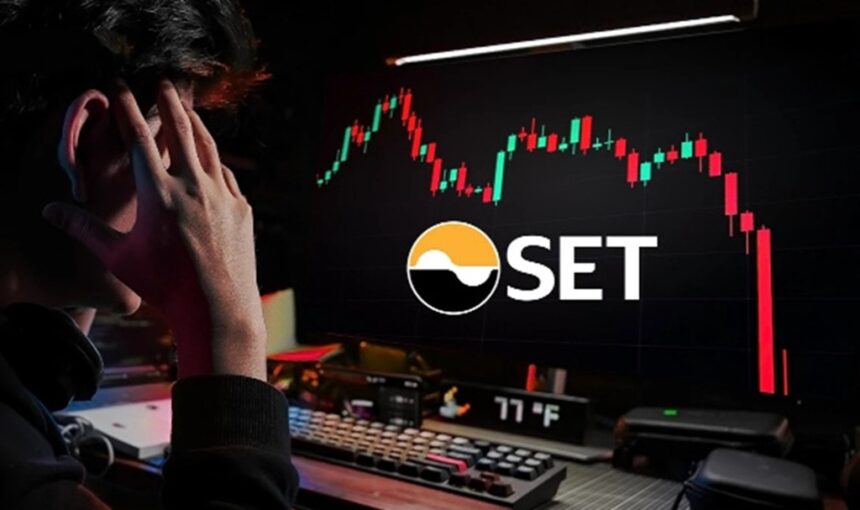Thailand’s Stock Exchange (SET) announced on Monday its decision to temporarily halt short selling of stocks and tighten trading regulations to reduce market volatility. This comes as global markets face instability following the U.S. imposing sweeping tariffs.
The short selling ban, which excludes market makers, along with stricter limits on stock price movements, will take effect on Tuesday and remain in place until April 11. The announcement followed a special board meeting, according to a statement from the exchange.
Financial markets in Thailand were closed Monday due to a local holiday.
The measures aim to stabilize trading conditions and give investors time to adjust to the impact of U.S. tariffs, which have caused significant market disruptions globally. Thailand faces a 36% tariff, one of the highest in the region. The country reported a $45 billion trade surplus with the U.S. last year.
Even before the tariff announcement, the Thai stock market was under pressure. Year-to-date losses have made it one of the poorest-performing markets globally. Last week, the SET index dropped 4.3%, extending its yearly decline to nearly 20% and hitting a five-year low.
The exchange said it will closely monitor market activity and adjust these temporary measures as needed. The changes will also apply to its other trading platforms, including the Market for Alternative Investment and Thailand Futures Exchange.
Authorities expressed confidence that these steps will help bring stability and restore investor confidence. The Securities and Exchange Commission (SEC) of Thailand stated it is working closely with the exchanges, noting the temporary rules should help address volatility across both spot and futures markets.
Global Stock Markets Hit Hard by U.S. Tariffs
On Monday, stock markets in the Asia-Pacific region experienced sharp declines not seen in decades due to the tariff-related turmoil. The Shanghai Composite fell over 8% during intraday trading, while Hong Kong’s Hang Seng plunged more than 13%. Japan’s Nikkei 225 dropped 7.8% by the close, an event one analyst referred to as a “bloodbath.”
European markets also opened lower, with banks and defense stocks taking the hardest hits. These declines follow last week’s slump, triggered by the U.S. imposing new tariffs ranging from 10% to 46% on various countries.
This development is particularly damaging for Asia’s manufacturing hubs, which rely heavily on the U.S. as a key export market for goods like clothing and automobiles. Wealthier nations such as Japan and South Korea face 26% tariffs, while developing economies like Vietnam are preparing for levies as high as 46%. Vietnam, singled out as a “major offender” by the U.S., is among the hardest hit.
Thailand, Cambodia, and China face similar challenges, with tariffs for these countries set at 36%, 49%, and 54%, respectively. Other nations, including Singapore, New Zealand, and Australia, are already subject to a baseline tariff of 10%.
Broader Impact on Global Trade
According to Qian Wang, chief economist for the Asia-Pacific region at Vanguard, higher tariffs are likely here to stay. This new reality raises fears of inflation and recession, particularly in the U.S., the world’s largest economy. A slowdown in the U.S. would further hurt Asian exports.
Mainland China, Hong Kong, and Taiwan markets saw their losses deepen as they reopened after last Friday’s global declines. The Shanghai Composite ended 7.3% lower, while Taiwan’s Weighted Index experienced a record 9.7% drop.
Elsewhere, Australia’s ASX 200 fell 4.2%, South Korea’s Kospi slid 5.6%, and the Hang Seng tumbled 13.2%, marking its steepest drop since 2008.
“Tariffs are fueling expectations of inflation and a potential recession,” said Julia Lee of FTSE Russell. Goldman Sachs now estimates a 45% chance of a U.S. recession within the next year, up from its previous forecast of 35%. Several other banks, including JPMorgan, have similarly increased their recession projections.
The tariff hikes are particularly harmful to smaller, export-driven economies across Asia. Countries like Vietnam and Bangladesh, whose exports heavily rely on the U.S., are bracing for significant challenges.
Vietnam is a major production hub for brands like Nike and Gap, while Bangladesh exports $8.4 billion worth of garments annually to the U.S. The new 37% tariff on Bangladesh is expected to create substantial headwinds for its economy.
China, Asia’s largest economy, has responded with retaliatory tariffs, adding to the global market instability. On Friday, all three major U.S. stock indexes fell more than 5%, with the S&P 500 seeing its worst week since 2020.
Across Europe, the FTSE 100 dropped 5%, its biggest loss in five years, while markets in Germany and France mirrored similar declines.
Looking ahead, global markets appear set for more turbulence. U.S. futures are trading lower, pointing to another challenging session on Wall Street. Since the announcement of the U.S. tariffs, global stock markets have shed trillions in value, with key trading partners such as China, the EU, and Vietnam facing some of the highest rates.
Frank Lavin, a former U.S. Department of Commerce official, noted, “Asia will bear a disproportionate burden due to its reliance on the U.S. as an export market.” With no signs of an immediate resolution, the uncertainty continues to weigh on global trade and investor sentiment.
Related News:
Thailand Joins Over 50 Nations for Negotiations on Trump Tariffs

Geoff Thomas is an award winning journalist known for his sharp insights and no-nonsense reporting style. Over the years he has worked for Reuters and the Canadian Press covering everything from political scandals to human interest stories. He brings a clear and direct approach to his work.












